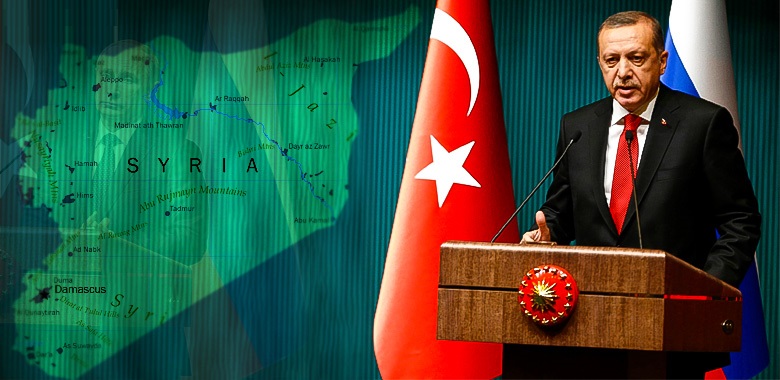AhlulBayt News Agency - The Syrian developments are not going as Erdogan wishes. Now Turkey is living in a regional and international isolation. The Syrian ceasefire which is approved by the two superpowers the US and Russia is moving just against the Turkish projected objectives. 14 percent of total Syria’s territory is now seized by the Kurdish Democratic Union Party (PYD).
Ankara has blacklisted the PYD as a terrorist group, but the Kurdish force is supported by Moscow and Washington. Such a backing to a Kurdish militant group could be challenging in Turkey’s southern borders. Furthermore, after shooting down the Russian bomber by the Turkish air force’s fighter jets in November 2015, the Turkish-Russian relations have reached a record low level, sometimes ending in verbal arguments between the presidents of the two countries.
On the one hand, Ankara has lost its significant role in the Syrian conflict and on the other hand it faced a boycott of Russian tourists’ visits and a ban by Moscow on importing food products to Russia from Turkey. Turkey has tried to get close to Tel Aviv through improving ties which have suffered some damages during the past years, but the Israeli Prime Minister Benjamin Netanyahu between closeness to the Turkish President Recep Tayyip Erdogan and the Russian President Vladimir Putin has preferred the latter.
Erdogan has also lashed out at the US over White House’s support for the Kurdish forces in Syria, however, the American President Barack Obama has well shrugged off all of the Turkish criticism. At the same time, the EU has only made two concessions to Ankara and it has not firmly had Turkey’s back in its spat with Russia. The first European privilege to Ankara was a funding to help Turkey shelter the influx of refugees flowing to its borders and the second privilege was turning a blind eye to Erdogan’s attacking and closing down the critical newspapers as well as putting strains on civil societies inside Turkey.
Saudi Arabia, an ally of Turkey, is still far from having adequate sway over the course of the Syrian peace talks. All of these reasons have led Erdogan’s government to send out two strong signals, implying that the Turkish foreign policy could now get softened.
The first signal was the surprise visit of the Turkish Prime Minister Ahmet Davutoglu to Tehran. It must be taken into account that the scheduled Iranian foreign minister’s visit to Turkey was unilaterally cancelled by Ankara seven months ago. At that time, President Erdogan was chasing his adventurous goals and he never thought that the Syrian developments could transform in favor of the Syrian President Bashar al-Assad and the Kurdish forces. Davutoglu’s frantic visit of Iran, meeting the Iranian president and issuing a joint Iranian-Turkish statement which has emphasized on the integrity and sovereignty of Syria, have sent a message that Turkey is so much worried about establishing autonomous Kurdish regions next to its borders in Syria. Ankara has called on Tehran to have a coordinated voice with Turkey over rejection of autonomy of the Kurds in Syria. Earlier, Russia has proposed implementing a federal system in Syria, a proposal refused by Riyad Hijab, the head and representative of the Syrian opposition in Geneva peace negotiations. Actually, Turkey expects Iran to play as a mediator to de-escalate tensions between Moscow and Ankara.
The Second Turkish signal was the apology of the Turkish chief air force general for downing the Russian SU-24 bomber. A formal apology was one of the preconditions set to Erdogan by Russia. According to the Turkish Today’s Zaman newspaper, Russia’s Putin in a phone conversation with his Kazakh counterpart President Nursultan Nazarbayev, who seems to be interested in launching a mediation between Moscow and Ankara, has reiterated that Turkey should take the first step towards improvement of relations with Russia. The apology offered by the Turkish air force, and not the government, perhaps would not be approved by the Russian government but it is a clue indicating that Ankara is retreating from its aggressive foreign policy. Amendment of foreign policy would not result in amended domestic policy in Turkey, however. Failing to achieve the foreign policy’s ambitious objectives and retreating from these policies would be considered a fiasco for Erdogan, an authoritarian figure in Turkey. To make up for foreign policy failure, Turkey could intensify crackdowns at home.
/129
source : Al Waqt News
Wednesday
16 March 2016
9:41:24 AM
741424

On the one hand, Ankara has lost its significant role in the Syrian conflict and on the other hand it faced a boycott of Russian tourists’ visits and a ban by Moscow on importing food products to Russia from Turkey. Turkey has tried to get close to Tel Aviv through improving ties...
